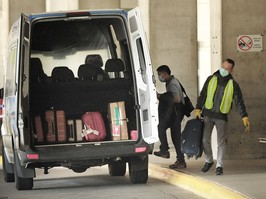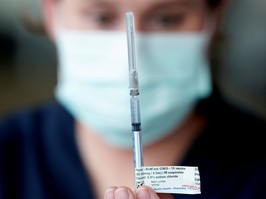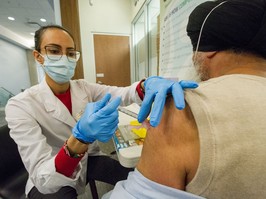by: elizabeth paynelisa zimmerman works from home. she doesn’t go to gyms, restaurants or any places where people congregate, except to get groceries or run essential errands. when she does, she always wears a mask and keeps her distance from others.according to public health messaging, that careful behaviour should be enough to protect her from getting covid-19. and yet it didn’t.earlier this month, the forty-something ottawa psychotherapist was diagnosed with b.1.351, the so-called south african variant of covid-19. the variant of concern is significantly more contagious than the original version of covid-19 and appears to be less susceptible to current vaccines.zimmerman’s partner, who does not live with her, tested positive at the same time. they are each other’s only close contacts and he also limits his outings to shopping for essentials while he is masked and distanced from others, she said.“basically, we followed all the guidelines we are being told to follow and then some, and we both got covid.”in addition to a cough, fever and extreme fatigue, zimmerman has been dealing with frustration over the way her case has been handled by ottawa public health.in a twitter thread, zimmerman wrote: “i got the south african variant of covid-19 in ottawa and based on public health’s response we are in big trouble.”she fears that contact tracing and messaging about risk of getting covid-19 have not kept up with the realities of the more contagious variants that now make up more than half of cases in ontario. and that could put people at risk.although she said the people she has dealt with at ottawa public health have tried to be helpful, the system seemed understaffed and the communications often confusing.she said contact tracing, which is done to track possible transmission and reduce spread, was limited to asking about her close contacts (she has just one) and whether she had been in a hospital, religious institution or school (which she hadn’t). she offered to give contact tracers a list of stores she had been in, but was told that wasn’t necessary.“i would have assumed because they are more contagious there are relatively few cases, that if they were going to track anything, they would track the variants.”she only found out that she was infected with a variant when she asked. her partner was never told whether he had a variant.she believes her partner became infected with covid-19 during a trip to a grocery store and passed it to her. but that possibility was called “unlikely” by the public health staffer she spoke to on the phone. zimmerman said she can’t think of another explanation.“public health seems to still be operating under the assumption that cases like ours don’t exist.”there have been other cases in the province in which people became infected after seemingly following all public health advice.dr. karim kurji, the medical officer of york region north of toronto recently told the canadian press that he had seen people who “seemed to have been quite careful … and acquired it nonetheless.” that could mean brief interactions, like short shopping trips, were to blame.the ministry of health does not require contact tracers to follow up on routine trips to grocery stores and shops by people who later tested positive if they were masked and not in prolonged contact, even with cases of variants on the rise.in updated guidance focused on the more contagious variants, the ministry says contact with a case within two metres for at least 15 minutes is deemed potentially risky, but that “transient interactions” such as brushing past someone are considered low risk.it does say that it is up to health units’ discretion whether they consider lower intervals of time that are more than transient to be risky — meaning contact of less than 15 minutes while masked.zimmerman said she is also concerned that a covid-positive neighbour in her building, with whom she shares a vent, might be related to her case. she said she alerted her landlord when she tested positive and has since stayed out of common spaces and had no contact with anyone else in the building. she conceded her neighbour’s case could be coincidental.in north bay, 42 people tested positive for covid-19 after an apartment building outbreak. at least a dozen of those cases were the south african variant of concern.in a statement, ottawa public health spokesperson donna casey said evidence has not shown that covid-19 can be transmitted to people in other rooms through a centra hvac system and, in fact, well-maintained systems can reduce transmission by bringing fresh air to indoor spaces and removing indoor air.casey also said that in more than half of cases oph is able to identify the source of acquisition of covid-19 as either close contact, outbreak or travel-related.“the purpose of contact tracing — the process of finding people at risk of acquiring the virus — helps people get tested early and reduces the opportunity for the virus to spread.”oph also uses “backward tracing” to help find the source of transmission by asking people who test positive to think back over the previous days and try to determine “where or from whom do you think you might have gotten sick?”
epayne@postmedia.com
 4 minute read
4 minute read












